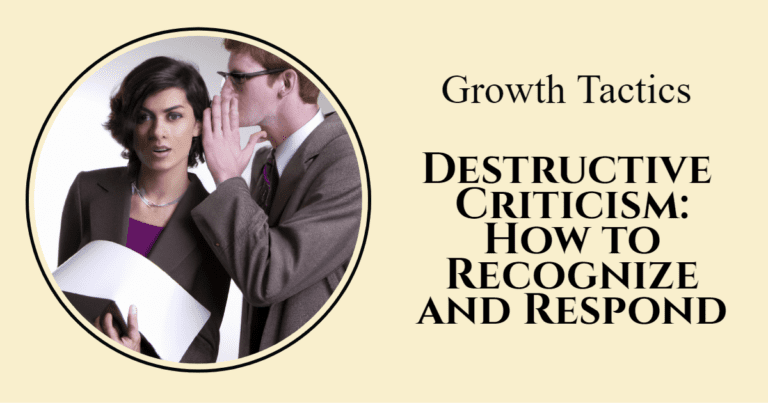Destructive criticism can affect our self-esteem and hinder our growth. That’s why it’s crucial to differentiate between constructive and destructive criticism and learn how to respond effectively.
In this article, I will provide you with valuable tips on recognizing and responding to destructive criticism, so you can navigate these situations with confidence and take actionable steps towards personal and professional growth.
Jump To Section
Constructive vs. Destructive Criticism: Understanding the Difference
Constructive criticism is an essential component of personal and professional development. It focuses on providing feedback and suggestions for improvement in a respectful and supportive manner. On the other hand, destructive criticism is laced with negativity and may even resort to personal attacks. It aims to tear you down rather than offering helpful guidance.
Understanding the difference between constructive and destructive criticism is crucial in protecting your self-esteem and well-being. Constructive criticism aims to help you grow and improve, while destructive criticism can have a detrimental effect on your self-confidence and abilities.
What Are the Effects of Destructive Criticism?
I have seen firsthand the profound impact that destructive criticism can have on individuals and relationships. Whether it occurs in the workplace, within a personal relationship, or even online, the effects of destructive criticism can be far-reaching and detrimental. Let’s take a closer look at some of the key effects:
-
Decreased Self-Esteem: Destructive criticism can chip away at an individual’s self-esteem, making them doubt their abilities and worth. Negative comments and constant criticism can lead to feelings of inadequacy, eroding their confidence over time.
-
Increased Stress and Anxiety: When subjected to destructive criticism, our bodies can react with heightened stress and anxiety. The constant fear of being criticized can trigger a fight-or-flight response, impacting our mental and emotional well-being.
-
Damaged Relationships: Destructive criticism can strain and even fracture relationships. When constantly bombarded with negative comments, it becomes challenging to maintain healthy and positive connections with others. Trust and open communication can suffer greatly.
-
Limited Growth and Creativity: Criticism, when presented constructively, can help individuals grow and improve. However, destructive criticism has the opposite effect. It stifles innovation, creativity, and personal growth. When individuals are constantly afraid of being criticized, they may shy away from taking risks and expressing their unique ideas.
-
Loss of Motivation: Destructive criticism can drain an individual’s motivation. Instead of feeling inspired to improve, they may lose all enthusiasm for their work or personal endeavors. The constant negativity can erode their drive to succeed and dampen their passion.
-
Negative Emotional Impact: Dealing with destructive criticism is emotionally taxing. It can lead to feelings of anger, shame, and sadness. Individuals may find themselves constantly on edge, anticipating criticism and bracing themselves for the emotional toll it takes.
Recognizing the effects of destructive criticism is the first step in addressing and counteracting its impact. Building a supportive and nurturing environment where constructive feedback is valued can promote personal growth, stronger relationships, and increased overall well-being.
Recognizing Destructive Criticism
Recognizing destructive criticism can sometimes feel like navigating a maze of disguised feedback. However, by being aware of a few key warning signs, you can become a pro at identifying destructive criticism when it comes your way. Let’s explore some of these telltale signs:
Personal Attacks: The Line That Should Never Be Crossed
Destructive criticism often goes beyond addressing the issue at hand and targets you personally. It may include hurtful personal attacks or insults that have no relevance to the task or situation. Remember, criticism should focus on the issue, not on attacking you as an individual. It’s important to recognize when someone has overstepped this line and is not offering constructive feedback.
Negative Tone: When Discouragement Takes Center Stage
One of the key characteristics of destructive criticism is its negative tone. Unlike constructive criticism, which aims to guide and help you improve, destructive criticism tends to focus solely on the flaws, without offering any positive aspects or solutions. It leaves you feeling demotivated and discouraged, rather than inspired to make positive changes. Pay close attention to the tone of the feedback you receive, and don’t let negativity overshadow your growth.
Lack of Specificity: Constructive Advice vs. Baseless Criticism
Destructive criticism often lacks specificity, making it difficult to understand what specifically needs improvement. It points out flaws without providing actionable advice on how to rectify them. In contrast, constructive criticism offers valuable guidance, highlighting specific areas for improvement and providing clear suggestions on how to address them. When you encounter criticism that lacks specificity, it may be a red flag that it’s leaning toward the destructive side of the spectrum.
By being aware of these warning signs, you can become better equipped to recognize destructive criticism when it arises. Remember, criticism should be constructive, aimed at helping you grow, and offering actionable steps towards improvement. Don’t let destructive criticism bring you down or hinder your progress. Stay confident, seek constructive feedback, and continue to thrive as a valuable team member.
Responding to Destructive Criticism: Navigating the Storm
When the winds of destructive criticism blow your way, it’s important to respond in a way that protects your self-esteem and allows for personal growth. Let’s explore some practical tips and strategies to handle these challenging situations:
Stay Calm: Weathering the Storm
When faced with destructive criticism, it’s only natural to feel defensive and let your emotions run wild. But remember, staying calm is the anchor that will keep you grounded. Take a deep breath, compose yourself, and approach the situation with a level head. By maintaining your composure, you’ll be better equipped to respond thoughtfully and effectively.
Evaluate the Criticism: Distinguishing Fact from Fiction
Step back from the storm and evaluate the criticism objectively. Look beyond the personal attacks and search for any grains of truth or constructive feedback hidden within. Separate the unnecessary negativity from the valuable insights. Focus on the aspects that can genuinely help you grow, disregarding the rest. Your ability to sift through the criticism will empower you to extract the gems of wisdom that lie beneath.
Express Your Feelings: A Calm and Courageous Conversation
If you feel comfortable doing so, calmly express how the criticism made you feel. Articulate your appreciation for feedback and your commitment to personal growth. However, it’s essential to establish boundaries by communicating that personal attacks are neither welcome nor productive. By asserting your need for respectful communication, you can foster a healthier dynamic that encourages growth and understanding.
Seek Clarification: Illuminating the Path to Growth
When faced with vague or general criticism, don’t hesitate to seek clarification. Politely ask for specific examples or areas that need improvement. Seeking clarification provides you with a clearer understanding of the issue at hand and enables you to identify actionable steps toward growth. Remember, the more specific the feedback, the more effectively you can address it.
Seek Support: Weathering the Storm Together
Don’t weather the storm alone. Reach out to trusted colleagues, mentors, or friends for support and advice. Discussing the situation with someone you trust can provide valuable perspective and help you process the feedback. By seeking support, you’ll gain the strength and reassurance needed to navigate the challenges of destructive criticism. Remember, storms are best weathered together.
In the face of destructive criticism, you have the power to respond in a way that preserves your self-esteem and propels personal growth. Stay calm amidst the storm, evaluate the criticism with a discerning eye, express your feelings with courage, seek clarification to illuminate the path forward, and lean on your support network for guidance. By implementing these strategies, you’ll navigate the stormy seas and emerge stronger, wiser, and more resilient than ever before.
Turning Destructive Criticism into Growth Opportunities: Embracing the Power Within
Sometimes, the sting of destructive criticism can leave us feeling disheartened. However, it’s important to recognize that within these challenging moments lies the potential for growth and personal development. So, let’s uncover the ways in which you can transform destructive criticism into opportunities for growth and self-improvement.
Focus on the Constructive Element: Unearthing the Gems
When faced with destructive criticism, dig deep and unearth any constructive aspects hidden within. Look for actionable feedback that can serve as a starting point for improvement. By shifting your focus to these elements, you can use the negativity as a catalyst for growth. Embrace the opportunity to make meaningful changes and emerge stronger than before.
Learn from the Experience: Forging Resilience and Strength
Receiving destructive criticism can be challenging, but it also presents a valuable chance to develop resilience and strength. Embrace the experience as a teacher, guiding you towards new skills and perspectives. By reframing the situation, you can view it as an opportunity for growth rather than a setback. Embrace the challenge and let it shape you into a more resilient and adaptable individual.
Prioritize Self-Care: Nurturing Your Well-being
Amidst the storm of criticism, it’s crucial to prioritize self-care. Engage in activities that replenish your self-esteem and well-being, whether it’s practicing mindfulness, pursuing hobbies you love, or surrounding yourself with positive influences. Recognize and celebrate your strengths and accomplishments, reminding yourself of your worth and potential. Nurturing yourself allows you to weather the storm with grace and clarity.
Seek Constructive Criticism: Embracing Growth Opportunities
When you’re ready, actively seek out constructive criticism from individuals you trust and respect. This proactive approach enables you to continue growing and improving while maintaining healthy boundaries. Embrace feedback as a tool for progress and seek guidance from those who can offer insightful perspectives. This way, you actively steer your path toward success and growth.
Remember, the ability to distinguish between constructive and destructive criticism empowers you to respond effectively, safeguard your self-esteem, and cultivate personal and professional growth. By harnessing the power of constructive criticism, you can transform negative feedback into actionable steps towards success. Stay confident, embrace the journey, and let nothing overshadow your pursuit of reaching your fullest potential as a valued team member.
Now, armed with these tips, go forth and navigate the world of criticism with grace and resilience!


